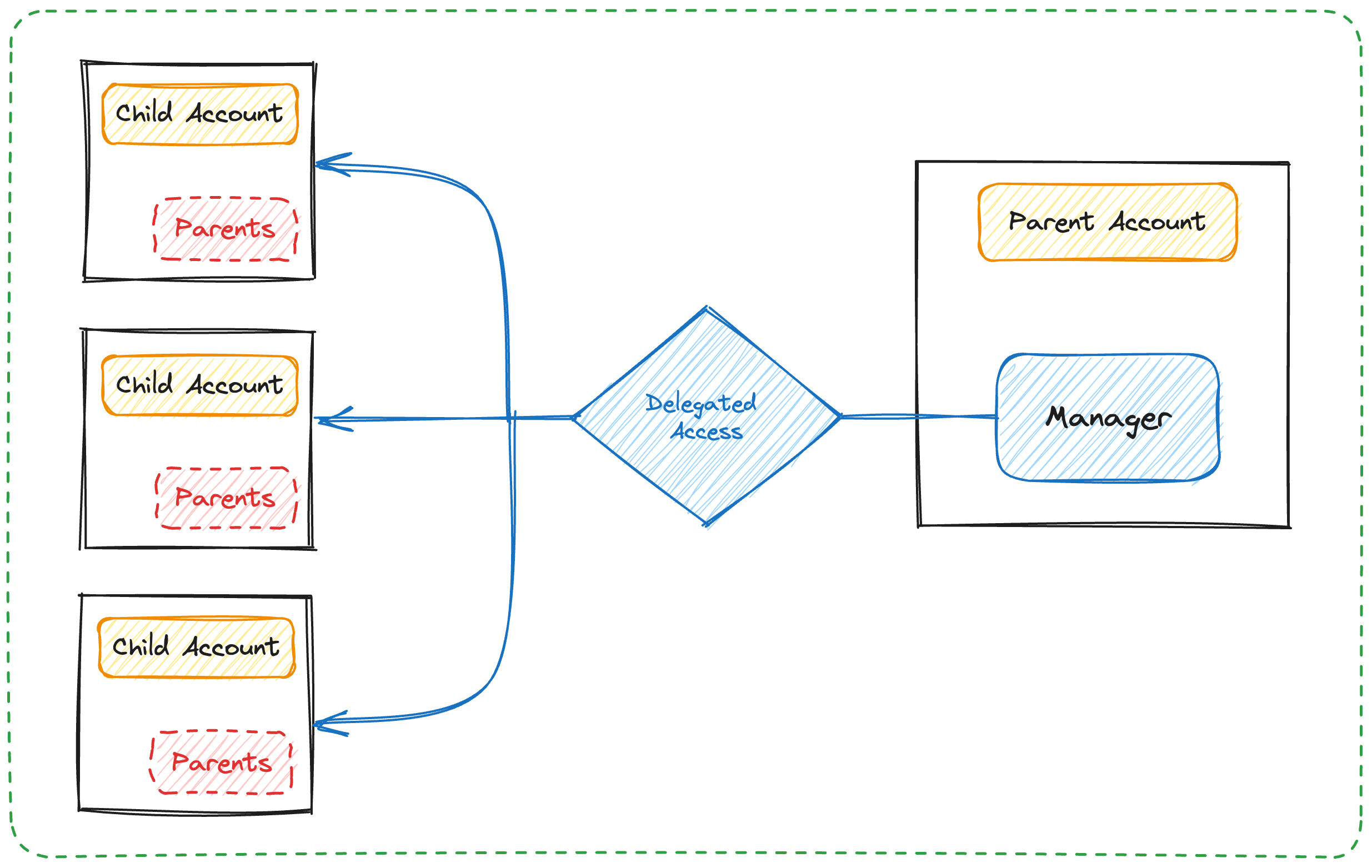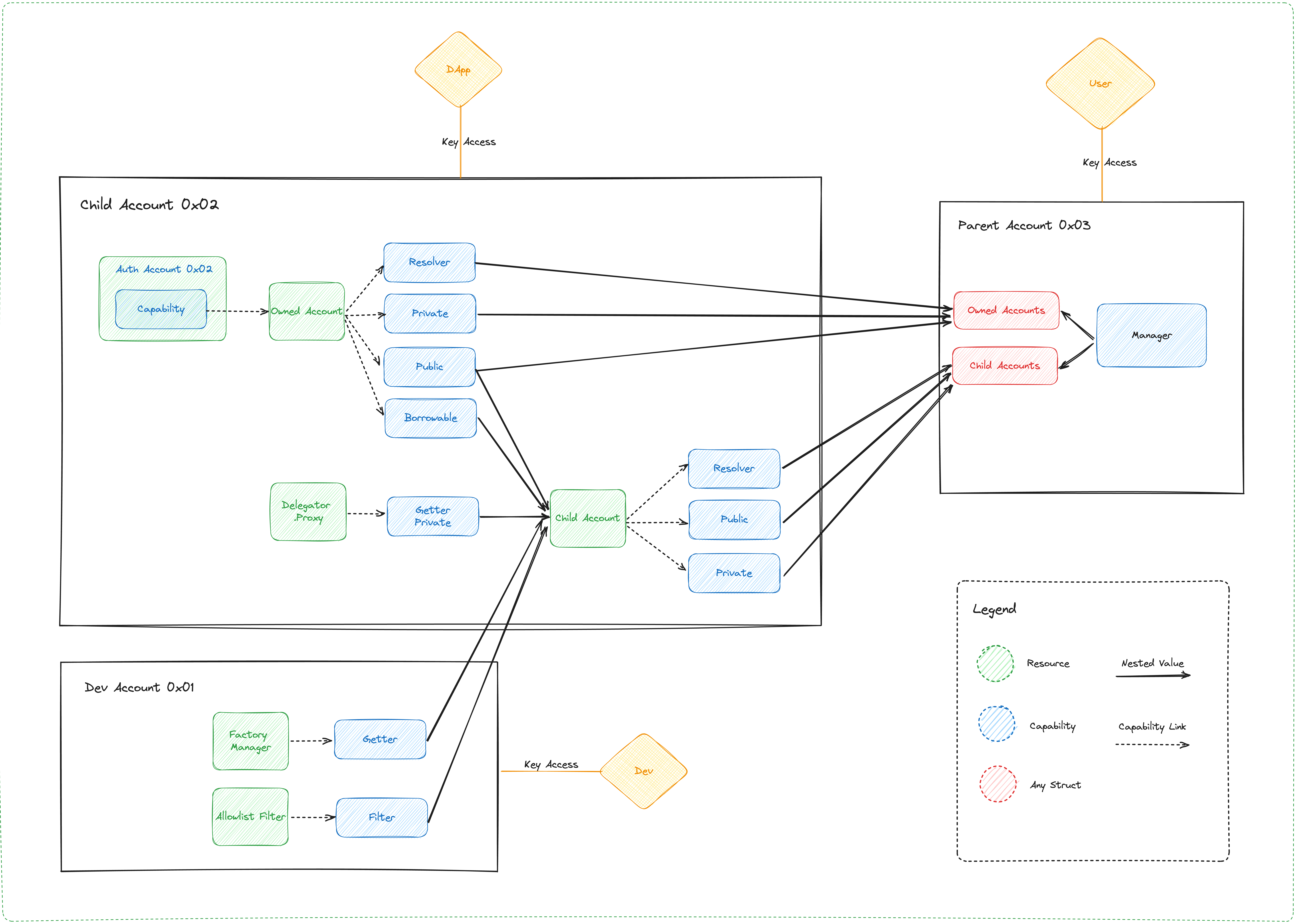Working With Parent Accounts
In this doc, we'll continue from the perspective of a wallet or marketplace app seeking to facilitate a unified account experience, abstracting away the partitioned access between accounts into a single dashboard for user interactions on all their owned assets.
Objectives
- Understand the Hybrid Custody account model
- Differentiate between restricted child accounts and unrestricted owned accounts
- Get your app to recognize “parent” accounts along with any associated “child” accounts
- View Fungible and NonFungible Token metadata relating to assets across all of a user's associated accounts - their wallet-mediated “parent” account and any hybrid custody model “child” accounts
- Facilitate transactions acting on assets in child accounts
Design Overview
TL;DR: An account's HybridCustody.Manager
is the entry point for all of a user's associated accounts.
The basic idea in the (currently proposed) standard is relatively simple. A parent account is one that has received delegated (albeit restricted) access on another account. The account which has delegated authority over itself to the parent account is the child account.
In the Hybrid Custody Model, this child account would have shared access between the app - the entity which created likely custodies the account - and the linked parent account.
How does this delegation occur? Typically when we think of shared account access in crypto, we think keys. However, Cadence enables accounts to link Capabilities to themselves and issue those Capabilities to other parties (more on capability-based access here).
We've leveraged this feature in a (proposed) standard so that apps can implement a hybrid custody model whereby the app creates an account it controls, then later delegates access on that account to the user once they've authenticated with their wallet.
All related constructs are used together in the HybridCustody
contract to define the standard.
Parent accounts own a Manager resource which stores Capabilities to ChildAccount (restricted access) and
OwnedAccount (unrestricted access) resources, both of which are stored in any given child account.
Therefore, the presence of a Manager in an account implies there are potentially associated accounts for which the
owning account has delegated access. This resource is intended to be configured with a public Capability that enables
querying of an account's child account addresses via getAccountAddresses() and getOwnedAccountAddresses().As you
can deduce from these two methods, there is a notion of "owned" accounts which we'll expand on in a bit.
A wallet or marketplace wishing to discover all of a user's accounts and assets within them can do so by first looking
to the user's Manager.
Identifying Account Hierarchy
To clarify, insofar as the standard is concerned, an account is a parent account if it contains a Manager resource,
and an account is a child account if it contains at minimum an OwnedAccount or additionally a ChildAccount resource.
Within a user's Manager, its mapping of childAccounts points to the addresses of its child accounts in each index,
with corresponding values giving the Manager access to those accounts via correspondingChildAccount Capability.

Likewise, the child account's ChildAccount.parentAddress (which owns a Manager) points to the user's account as its
parent address. This makes it easy to both identify whether an account is a parent, child, or both, and its associated
parent/child account(s).
OwnedAccount resources underly all account delegations, so can have multiple parents whereas ChildAccounts are 1:1.
This provides more granular revocation as each parent account has its own Capability path on which its access relies.
Restricted vs. Owned Accounts
It's worth noting here that ChildAccount Capabilities enable access to the underlying account according to rules
configured by the child account delegating access. The ChildAccount maintains these rules along with an OwnedAccount
Capability within which the AuthAccount Capability is stored. Anyone with access to the surface level ChildAccount
can then access the underlying AuthAccount, but only according the pre-defined rule set. These rules are fundamentally
a list of Types that can/cannot be retrieved from an account.
The app developer can codify these rule sets on allowable Capability types in a
CapabilityFilter along with a
CapabilityFactory defining retrieval
patterns for those Capabilities. When delegation occurs, the developer would provide the CapabilityFilter and
CapabilityFactory Capabilities to an OwnedAccount resource which stores them in a ChildAccount resource. Then,
capabilities are created for the OwnedAccount and ChildAccount resource and are given to the specified parent
account.
So, if an app developer wants to enable Hybrid Custody but doesn't want to allow parent accounts to access FungibleToken
Vaults, for example, the app developer can codify rule sets enumerating allowable Capability types in a
CapabilityFilter along with a CapabilityFactory defining retrieval patterns for those Capabilities.
When delegation occurs, they would provide the CapabilityFilter and CapabilityFactory Capabilities to an
OwnedAccount. This OwnedAccount then wraps the given filter & factory Capabilities in a ChildAccount along with a
Capability to itself before publishing the new ChildAccount Capability for the specified parent account to claim.
Note that by enumerating allowable Types in your CapabilityFilter.Filter implementation, you're by default excluding
access to anything other than the Types you declare as allowable.
As mentioned earlier, Managers also maintain access to "owned" accounts - accounts which define unrestricted access as
they allow direct retrieval of encapsulated AuthAccount objects. These owned accounts, found in Manager.ownedAccounts,
are simply OwnedAccount Capabilities instead of ChildAccount Capabilities.

Considerations
Do note that this construction does not prevent an account from having multiple parent accounts or a child account from being the parent to other accounts. While initial intuition might lead one to believe that account associations are a tree with the user at the root, the graph of associated accounts among child accounts may lead to cycles of association.
We believe it would be unlikely for a use case to demand a user delegates authority over their main account (in fact we'd discourage such constructions), but delegating access between child accounts could be useful. As an example, consider a set of local game clients across mobile and web platforms, each with self-custodied app accounts having delegated authority to each other while both are child accounts of the user's main account.
Ultimately, it will be up to the implementing wallet/marketplace how far down the graph of account associations they'd want to traverse and display to the user.
Implementation
From the perspective of a wallet or marketplace app, some relevant things to know about the user are:
- Does this account have associated linked (child) accounts?
- What are those associated linked accounts, if any?
- What NFTs are owned by this user across all associated accounts?
- What are the balances of all FungibleTokens across all associated accounts?
And with respect to acting on the assets of child accounts and managing child accounts themselves:
- Accessing an NFT from a linked account's Collection
- Removing a linked account
Examples
Query Whether an Address Has Associated Accounts
This script will return true if a HybridCustody.Manager is stored and false otherwise
Query All Accounts Associated with Address
The following script will return an array of addresses associated with a given account's address, inclusive of the provided address.
Query All Owned NFT Metadata
While it is possible to iterate over the storage of all associated accounts in a single script, memory limits prevent this approach from scaling well.
Since some accounts hold thousands of NFTs, we recommend breaking up iteration, utilizing several queries to iterate over accounts and the storage of each account. Batching queries on individual accounts may even be required based on the number of NFTs held.
- Get all associated account addresses (see above)
- Looping over each associated account address client-side, get each address's owned NFT metadata
For simplicity, we'll show a condensed query, returning NFT display views from all accounts associated with a given address for a specified NFT Collection path.
At the end of this query, the caller will have a mapping of Display views indexed on the NFT ID and grouped by account
Address. Note that this script does not take batching into consideration and assumes that each NFT resolves the
MetadataViews.Display view type.
Query All Account FungibleToken Balances
Similar to the previous example, we recommend breaking up this task due to memory limits.
- Get all linked account addresses (see above)
- Looping over each associated account address client-side, get each address's owned FungibleToken Vault metadata
However, we'll condense both of these steps down into one script for simplicity:
The above script returns a dictionary of balances indexed on the type and further grouped by account Address.
The returned data at the end of address iteration should be sufficient to achieve a unified balance of all Vaults of similar types across all of a user's associated account as well as a more granular per account view.
You might consider resolving
FungibleTokenMetadataViews
to aggregate more information about the underlying Vaults.
Access NFT in Child Account from Parent Account
A user with NFTs in their child accounts will likely want to utilize said NFTs. In this example, the user will sign a
transaction a transaction with their authenticated account that retrieves a reference to a child account's
NonFungibleToken.Provider, enabling withdrawal from the child account having signed with the parent account.
At the end of this transaction, you withdrew an NFT from the specified account using an NFT Provider Capability. A
similar approach could get you any allowable Capabilities from a signer's child account.
Revoking Secondary Access on a Linked Account
The expected uses of child accounts for progressive onboarding implies that they will be accounts with shared access. A user may decide that they no longer want secondary parties to have access to the child account.
There are two ways a party can have delegated access to an account - keys and AuthAccount Capability. With
ChildAccount mediated access, a user wouldn't be able to revoke anyone's access except for their own. With
unrestricted access via OwnedAccount, one could remove parents (OwnedAccount.removeParent(parent: Address)) thereby
unlinking relevant Capabilities and further destroying their ChildAccount and CapabilityDelegator resources.
Ultimately, things are not entirely straightforward with respect to AuthAccount Capabilities, at least not until
Capability Controllers enter the picture. This is discussed in more detail in the
Flip. For now, we recommend that
if users want to revoke secondary access, they transfer any assets from the relevant child account and remove it from
their Manager altogether.
Remove a Child Account
As mentioned above, if a user no longer wishes to share access with another party, it's recommended that desired assets
be transferred from that account to either their main account or other linked accounts and the linked account be removed
from their HybridCustody.Manager. Let's see how to complete that removal.
After removal, the signer no longer has delegated access to the removed account via their Manager and the caller is
removed as a parent of the removed child.
Note also that it's possible for a child account to remove a parent. This is necessary to give application developers and ultimately the owners of these child accounts the ability to revoke secondary access on owned accounts.